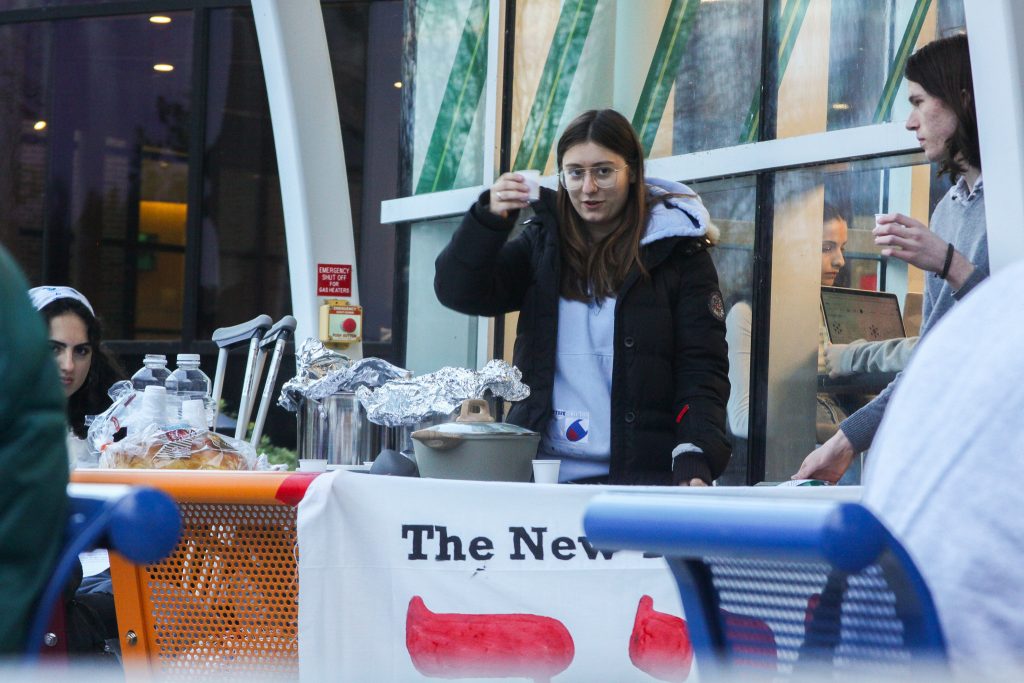The New Yiddish Bund of Binghamton, a newly established student organization, hosted “Shabbat for a Cease-fire” Friday night on the Peace Quad.
Seeking to provide a platform for Jewish perspectives that may diverge from those of established organizations on campus, The Bund’s planned event was for “like-minded” community members. Though other organizations did not participate in organizing the event, the group extended invitations to other cultural and activist groups.
Amari Pavati, The Bund’s president and a sophomore double-majoring in geography and classical studies, said that his goal was to create an alternative space for Jewish students on campus, because he believed that existing organizations may not fully represent the entire Jewish student body’s full range of values and beliefs. They said that while Hillel at Binghamton and the Rohr Chabad Center for Jewish Student Life have positioned themselves in support of Israel, themselves and some of their peers were looking for a space to express different views.
“I believed in doing some kind of a Yiddish cultural club, because I grew up in a Klezmer scene, which is like a sub-genre of Jewish folk music from Eastern Europe,” Pavati said. “There’s a big revival of it in Austin, [Texas], which is where I’m from, but what really sparked this specifically was seeing the dissonance between the [Students for Justice in Palestine] (SJP) community and the Jewish community at that first big rally.”
At the Shabbat event, a Kiddush — a ceremony of prayer and blessing over grape juice — was performed. Challah, a traditional Jewish braided bread, and matzah ball soup were served to guests. Those attending began discussions after Pavati gave a brief speech about wanting The Bund to be a safe haven, where individuals can express their thoughts on the ongoing conflict, happening both globally and locally.
Pavati described how his experience attending the first SJP rally led to him creating The Bund.
“I had watched from the side for a lot of that, and then I ended up having to leave,” Pavati said. “It was too emotional, especially seeing the counter-protests, the way people were talking and the real intensity of that. I wouldn’t say that was the moment, but that was the moment where I was like ‘there needs to be some kind of other Jewish community, and I either need to find it or start it.’”
The Bund draws inspiration from the historical Jewish General Labor Bund — Yiddish for union — which serves as a model for the organization. The Bundism movement, which thrived in the 20th century, was known for standing against Palestinian oppression, anti-Semitism and the exploitation of workers, according to Pavati. It also promotes Yiddish culture, a fundamental aspect of their Jewish upbringing.
Pavati said that as the organization gains more recognition on campus, its intention is not solely focused on spreading a specific message, but rather fostering a sense of community. He added that “Shabbat for a Cease-fire” was just the beginning, and he envisions hosting various future political and cultural events, seeing itself as a prominent voice for the Jewish left at the University. They emphasized that the event was not a protest, but rather a Shabbat gathering, where Jewish students could freely express their identity outside of organizations they may disagree with. He said that he hoped the organization’s presence on campus would serve as a reminder of the wide range of Jewish identities and beliefs, all deserving of recognition and respect.
An event attendee, who wished to remain anonymous, praised The Bund’s goals.
“It’s inspiring to see,” they said. “I feel like it’s kind of hard because I’m a little bit involved in some of the other Jewish organizations on campus as well. There’s very little space for differences in opinion. It’s inspiring to see that there’s a lot of people who probably share my views that kind of feel a little bit intimidated to say because they’re socially ideological. It feels very kind of cathartic that there’s a new space opening specifically for this.”



